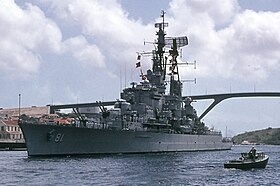Almirante gray (CLM-81)
 The Almirante Grau near Willemstad on her way to her new home port of Callao in Peru, 30 June 1973 |
|
| Overview | |
|---|---|
| Shipyard | |
| Keel laying | September 5, 1939 |
| Launch | December 24, 1944 |
| 1. Period of service |
|
| Commissioning | November 18, 1953 |
| Decommissioning | October 12, 1972 |
| 2. Period of service |

|
| Commissioning | May 23, 1973 |
| Decommissioning | 26th September 2017 |
| home port | Callao |
| Technical specifications | |
| displacement |
|
| length |
187.30 m |
| width |
17.25 m |
| Draft |
5.64 m |
| crew |
973 |
| drive |
|
| speed |
32 kn |
| Range |
7000 nm at 12 kn |
| Armament |
1953
1996 |
The BAP Almirante Grau (CLM-81) , built as De Ruyter (full Dutch name: Mr. Ms. Kruiser De Ruyter ) was a De Zeven Provinciën class cruiser of the Royal Netherlands Navy . She entered service in 1953 and was the ninth ship to be named after Admiral Michiel de Ruyter . This cruiser was, together with its sister ship De Zeven Provinciën , the largest warship built in the Netherlands .
After her career with the Dutch Navy in 1972, she was sold to Peru , where she was put back into service in 1973 as BAP Almirante Grau (CLM-81). The Peruvian Navy decommissioned it on September 26, 2017, 78 years after its launch.
history
Dutch Navy
The cruiser was on September 5, 1939 at Wilton Fijenoord in Schiedam as De Zeven Provinciën under the hull number 670 attached to Kiel . Together with her sister ship Eendracht , she was intended to replace the obsolete cruisers of the Java class . After the German occupation of the Netherlands, construction continued slowly, but later stopped by the occupying forces . On December 24, 1944, the shell was lowered to serve as a waterway barrier. However, this plan could no longer be carried out and the unfinished hull remained in the port of Schiedam.
After the end of the war and the salvage of the shell, completion began according to heavily modified plans. Above all, the armament had to be completely redesigned. The gun turrets originally planned and ordered in Sweden were no longer available because the Swedish Navy had already used them for its own Tre Kronor class . The ship also had to be renamed, because on August 22, 1950 Queen Juliana christened her sister ship, the former Eendracht , as De Zeven Provinciën in Rotterdam. The name De Ruyter was chosen based on the light cruiser sunk in the Java Sea in 1942 (at that time the largest unit of the Dutch Navy) .
The De Ruyter could not be put into service until November 18, 1953. With the 926 strong crew and Queen Juliana and her husband Prince Bernhard on board, the ship set out on a trip to the Netherlands Antilles in 1955 . While the sister ship De Zeven Provinciën was modernized in the early 1960s and equipped with guided missile launchers, the De Ruyter did not do this due to lack of funds.
Peruvian Navy
After the decommissioning of the Koninklijke Marine in 1972, the Netherlands sold the ship to Peru , where it was put back into service on May 23, 1973 as Almirante Grau . It was in service until 2017 and was most recently the last active warship with heavy artillery as its main armament. Between 1985 and 1988, while modernization work was being carried out on the ship in Amsterdam, the name was changed to Proyecto de Modernización 01 or PM-01 . During this time, the sister ship Aguirre was operated as Almirante Grau .
